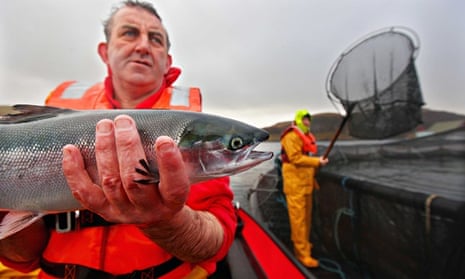Farmed salmon should be sterilised to prevent them breeding with wild fish and introducing genetic weaknesses, experts have urged.
New research shows that while salmon bred in captivity for food consumption are genetically different from their wild relatives, they are just as fertile, potentially damaging wild populations if they escape and breed with them.
Millions of salmon escape from fish farms each year, and can get into wild spawning populations where they can reproduce and introduce negative genetic traits.
Recently-escaped salmon are not as good at reproducing as wild fish, but the new research shows that their sperm and eggs are as potent as those of wild salmon.
If farmed salmon can revive their spawning behaviour by a period in the wild, they could breed with wild populations, the researchers said.
Lead researcher Professor Matt Gage, from the University of East Anglia’s school of biological sciences, said: “Around 95% of all salmon in existence are farmed, and domestication has made them very different to wild populations, each of which is locally adapted to its own river system.
“Farmed salmon grow very fast, are aggressive, and not as clever as wild salmon when it comes to dealing with predators.
“These domestic traits are good for producing fish for the table, but not for the stability of wild populations.
“The problem is that farmed salmon can escape each year in their millions, getting into wild spawning populations, where they can then reproduce and erode wild gene pools.”
Researchers used a series of in-vitro fertilisation tests in conditions which mimicked spawning in the wild. All tests on sperm and eggs showed the farmed salmon were as fertile as wild salmon, identifying a clear threat that they could breed with wild populations.
Prof Gage said: “Some Norwegian rivers have recorded big numbers of farmed fish present – as much as 50%. Both anglers and conservationists are worried by farmed fish escapees which could disrupt locally-adapted traits like timing of return, adult body size and disease resistance.
“Salmon farming is a huge business in the UK, Norway and beyond, and while it does reduce the pressure on wild fish stocks, it can also create its own environmental pressures through genetic disruption.”
He said a viable solution was to induce a condition called “triploidy”, by pressure-treating salmon eggs just after fertilisation, so the fish grows as normal but with both sex chromosomes, which makes most of them infertile.
The process, normal for farming rainbow trout, has not been embraced by the industry because of fears the triploid fish do not perform as well in farms as normal fish, eroding profits, he said.

Comments (…)
Sign in or create your Guardian account to join the discussion